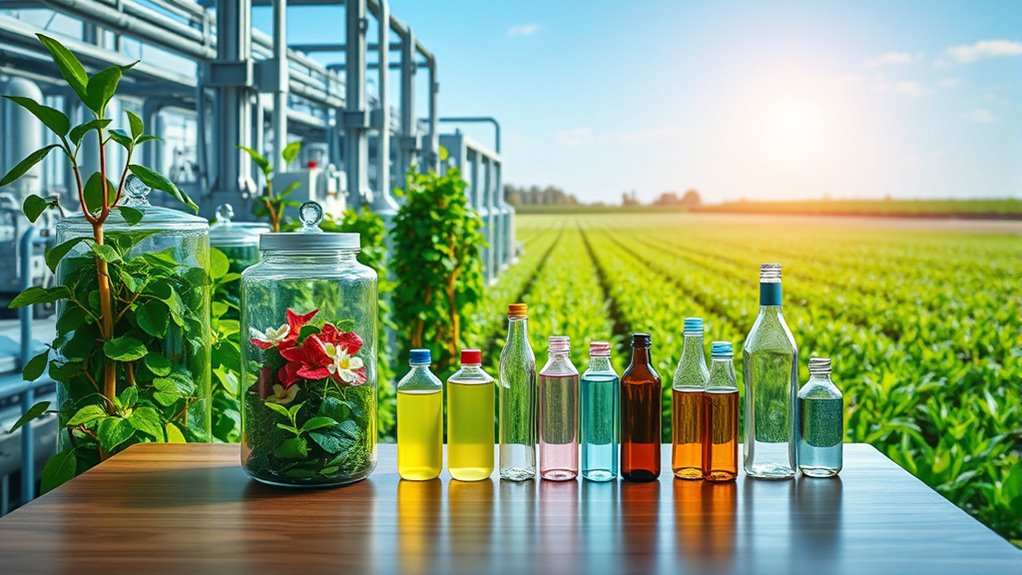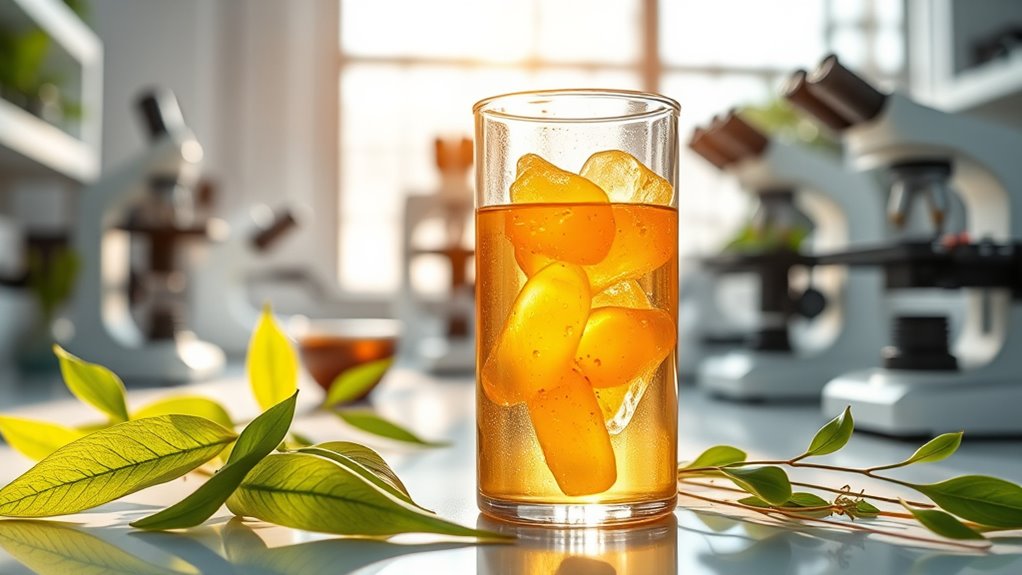Plant-based plastics show promise in replacing oil-derived polymers, but challenges remain. Many biopolymers don’t biodegrade easily in natural environments and often need industrial composting to break down properly. Sourcing raw materials from crops like corn or sugarcane can impact food security and rely on intensive farming. Supply chain stability and resource availability also pose hurdles. To learn how these issues are being addressed and whether biopolymers can truly replace oil-based plastics, keep exploring the details.
Key Takeaways
- Biopolymers can replace oil-based plastics if they achieve consistent biodegradability in natural environments.
- Sourcing raw materials sustainably is essential to avoid competing with food production and minimize environmental impact.
- Advances in biopolymer technology can improve durability, degradation pathways, and supply chain resilience.
- Addressing resource variability and supply chain stability is crucial for large-scale adoption of plant-based plastics.
- Responsible development of biopolymers ensures environmental safety and enhances their potential to replace traditional plastics effectively.

Plant-based plastics are an innovative solution to reduce reliance on traditional petroleum-based materials and combat environmental pollution. However, shifting to biopolymers isn’t without hurdles. One of the main challenges lies in biodegradability. While these plastics are often marketed as eco-friendly, not all plant-based plastics break down easily in natural environments. Some degrade only under industrial composting conditions, which limits their effectiveness in reducing long-term waste. This inconsistency in biodegradability can create confusion and potentially undermine the environmental benefits they promise. To truly replace oil-based plastics, it’s essential that these biopolymers are designed with clear, predictable degradation pathways, guaranteeing they do not persist in ecosystems and contribute to pollution.
Not all plant-based plastics biodegrade easily, limiting their environmental impact and causing potential confusion.
Another significant factor influencing the viability of plant-based plastics is renewable resource sourcing. Unlike fossil fuels, which are finite and polluting to extract, renewable resources like corn, sugarcane, or cassava serve as raw materials for biopolymers. Yet, sourcing these materials sustainably presents its own set of challenges. Large-scale cultivation of crops for bioplastics can compete with food production, leading to concerns about food security and land use. Additionally, intensive farming practices may involve significant water use, pesticide application, and land modification, which can offset some of the environmental gains these plastics aim to achieve. To truly replace oil, the industry must develop methods to source renewable materials responsibly, possibly by utilizing agricultural waste or developing bio-based plastics from non-food crops or algae, reducing the strain on land and resources.
Furthermore, the supply chain for plant-based plastics must become more efficient and resilient. Currently, fluctuations in crop yields and prices can impact the availability and cost of raw materials. If biopolymer production cannot keep pace with demand or becomes economically unviable, it risks falling back on traditional plastics or creating new sustainability issues. Advancements in biotechnology and agricultural practices are essential to producing more durable, versatile, and affordable plant-based plastics. These improvements will help guarantee a stable supply of raw materials sourced from renewable resources, making it easier for industries to shift away from oil.
While plant-based plastics present promising environmental benefits, addressing biodegradability challenges and guaranteeing sustainable resource sourcing are critical steps. Only then can biopolymers become a truly viable, eco-friendly alternative to conventional plastics, helping you reduce your environmental footprint without compromising on performance or availability.
Frequently Asked Questions
How Biodegradable Are Plant-Based Plastics Under Different Environmental Conditions?
You’re curious about how biodegradable plant-based plastics are in various environments. Their degradation rates and environmental impact vary depending on conditions like temperature, moisture, and microbial activity. In composting settings, they break down faster, reducing pollution. However, in landfills or marine environments, degradation slows considerably, affecting their overall environmental impact. So, understanding these factors helps you assess their true sustainability and how effectively they replace traditional plastics.
What Are the Main Challenges in Scaling Biopolymer Production Globally?
Think of scaling biopolymer production as building a bridge to a greener future. You face challenges like market adoption hurdles, where consumers and industries hesitate. Supply chain issues, such as sourcing renewable materials and processing them efficiently, also slow progress. Overcoming these obstacles requires innovation, investment, and policy support. When you address these, you help transform biopolymers from niche options into widespread, sustainable alternatives for global use.
Do Bioplastics Require Special Recycling Processes or Facilities?
You need to know that bioplastics often require specialized recycling infrastructure and waste management processes. Unlike traditional plastics, they may need separate collection or treatment to prevent contamination and guarantee proper breakdown. Without this, bioplastics could end up in landfills or oceans, negating their environmental benefits. Investing in tailored recycling facilities helps maximize their eco-friendly potential, making it essential for sustainable waste management strategies.
How Do the Costs of Biopolymers Compare to Traditional Plastics?
You might think biopolymers are too costly, but their economic feasibility is improving. Currently, they often cost more than traditional plastics due to production and raw material expenses. However, as technology advances and demand grows, market competitiveness increases, potentially lowering prices. In the long run, biopolymers could become a viable, sustainable alternative, especially as environmental considerations push industries to adopt greener materials.
Are There Any Health Risks Associated With Biopolymer Degradation?
You might wonder if biopolymer degradation poses health risks. While generally considered safe, there are toxicity concerns if harmful additives are used during production. Some biopolymers could cause allergenic risks, especially for sensitive individuals. It’s important to monitor the degradation process to guarantee no harmful substances are released. Overall, with proper regulation and testing, biopolymers can be a safe alternative, but ongoing research is essential to address potential health concerns.
Conclusion
Imagine a world where your choices grow like a lush garden, replacing oil-based plastics with sustainable biopolymers. While plant-based plastics offer a promising path, they’re just the start of a journey toward a greener future. By embracing these eco-friendly materials, you’re planting seeds of change that can blossom into a cleaner planet. Together, you can turn the tide, transforming our environment from a fragile vase into a thriving, resilient forest.









